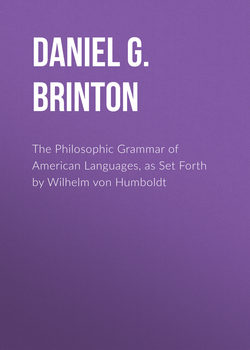Читать книгу The Philosophic Grammar of American Languages, as Set Forth by Wilhelm von Humboldt - Daniel G. (Daniel Garrison) Brinton - Страница 7
The Philosophic Grammar of American Languages
§ 7. Formal and Material Elements of Language
ОглавлениеA fundamental distinction in philosophic grammar is that which divides the formal from the material element of speech. This division arises from the original double nature of each radical, as expressing both Being and Action.
On the one hand, Action involves Relation; it assumes an object and a subject, an agent, a direction of effort, a result of effort; usually also limitations of effort, time and space, and qualifications as to the manner of the effort. In other words, Action is capable of increase or decrease both in extension and intension.
On the other hand, Being is a conception of fixed conditions, and is capable of few or no modifications.
The formal elements of a language are those which express Action, or the relation of the ideas; they make up the affixes of conjugations and declensions, the inflections of words; they indicate the parts of speech, the so-called “grammatical categories,” found in developed tongues. The material elements are the roots or stems expressing the naked ideas, the conceptions of existence apart from relation.
Using the terms in this sense, Humboldt presents the following terse formula, as his definition of Inflection: “Inflection is the expression of the category in contrast to the definition of the idea.”28 Nothing could be more definitive and lucid than this concise phrase.
The inflectional or formal elements of language are usually derived from words expressing accessory ideas. Generally, they are worn down to single letters or a single syllable, and they usually may be traced back to auxiliary verbs and pronouns.
Often various accessories are found which are not required by the main proposition. This is a common fault in the narratives of ignorant men and in languages and dialects of a lower grade. It is seen in the multiplication of auxiliaries and qualifying particles observed in many American languages, where a vast number of needless accessories are brought into every sentence.
The nature of the relations expressed by inflections may be manifold, and it is one of the tasks of philosophic grammar to analyze and classify them with reference to the direction of mental action they imply.
It is evident that where these relations are varied and numerous, the language gains greatly in picturesqueness and force, and thus reacts with a more stimulating effect on the mind.
28
His explanation of inflection is most fully given in his Introductory Essay, Ueber die Verschiedenheit, etc., § 14, Gesammelte Werke, s. 121, sqq. A sharp, but friendly criticism of this central point of his linguistic philosophy may be found in Steinthal, Charakteristik der Hauptsächlichsten Typen des Sprachbones, ss. 58-61. Humboldt certainly appears not only obscure in parts but contradictory.
